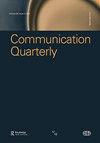On (not) seeing the chicken: Perdue, animal welfare, and the failure of transparency
IF 1
Q2 COMMUNICATION
引用次数: 0
Abstract
ABSTRACT In this essay, we analyze Perdue’s animal welfare campaign from 2016 to 2020 to isolate how demands for transparency are mediated and subverted by Perdue’s public facing rhetoric. Though Perdue’s annual releases and commitments to change nominally constitute a victory for animal welfare advocates, the company’s campaign enacts transparency as a sort of publicity for the company that belies marginal gains for the lives of chickens and may ultimately result in increased meat consumption. In providing trackable metrics, offering paternalistic justifications for their treatments of chickens, and through strategic omissions of language and visuals, Perdue satisfies demands for transparency without committing the company to meaningful changes. In that way, transparency-publicity becomes a performative end that allows the company to continue its behavior and give consumers cover for increased meat consumption. We conclude with the implications of this co-optation.关于(不)看到鸡:珀杜,动物福利,以及透明度的失败
在本文中,我们分析了珀杜公司从2016年到2020年的动物福利运动,以孤立对透明度的要求是如何被珀杜公司面向公众的言论所调解和颠覆的。虽然珀杜公司的年度释放和改变承诺在名义上构成了动物福利倡导者的胜利,但该公司的活动将透明度作为公司的一种宣传,掩盖了鸡的生命的边际收益,最终可能导致肉类消费的增加。通过提供可追踪的指标,为他们对待鸡的方式提供家长式的理由,以及通过战略性地省略语言和视觉效果,珀杜满足了对透明度的要求,而无需让公司做出有意义的改变。这样,透明的宣传就变成了一种行为目的,使公司能够继续其行为,并为消费者增加的肉类消费提供掩护。最后,我们谈谈这种增选的影响。
本文章由计算机程序翻译,如有差异,请以英文原文为准。
求助全文
约1分钟内获得全文
求助全文

 求助内容:
求助内容: 应助结果提醒方式:
应助结果提醒方式:


